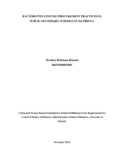| dc.contributor.author | Wachira, Robinson K | |
| dc.date.accessioned | 2013-11-12T09:05:45Z | |
| dc.date.available | 2013-11-12T09:05:45Z | |
| dc.date.issued | 2013-11 | |
| dc.identifier.citation | Degree in Master of Business Administration | en |
| dc.identifier.uri | http://erepository.uonbi.ac.ke:8080/xmlui/handle/123456789/58653 | |
| dc.description | A Research Project Report Submitted in Partial Fulfillment of the Requirements for
Award of Master of Business Administration, School of Business, University of
Nairobi. | en |
| dc.description.abstract | This research project sought to establish the factors that were influencing the kind of
procurement practices being employed by the public secondary schools in Mathioya
district. The specific objectives of the study were determine whether public secondary
schools in Mathioya district were employing best practices in procurement with regard to
budgetary management, leadership, transparency and timeliness in the process and to
establish areas of improvement in order to have best practices in procurement in public
secondary schools in Mathioya district. The study was a census survey that adopted a
descriptive approach aimed at describing aspects of the procurement practices in the
public secondary schools. Questionnaires targeting 124 respondents who are in one way
or the other involved in school procurement were used to collect the data. From the
findings it was noted that the public secondary schools in Mathioya district have to a
reasonable extent complied with the Ministry of Education policies regarding
procurement. There however, were some factors that were either complicating or limiting
the possibility of having best practices in procurement in these schools. Some of the
factors found included the skills in procurement possessed by those undertaking the task,
funding and external factors like inflation. It also raised issues on the transparency of the
process indicating that in most cases there is external influence and failure to adhere to
the ethics of procurement. The research also found that the procurement process fails in
timeliness perhaps because of complexity of the process or because more often than not,
suppliers are supplying on credit. This led to frequent situations where those involved in
the process take shortcuts to overcome the problem of delays and length of the standard
process. Based on the findings of the study, the researcher recommends more training for
those involved in procurement, timely funding as well as tightening the loopholes that
compromise transparency and ethics in the procurement process. He also recommends the
review of the prescribed procurement process to try and make it shorter and less complex. | en |
| dc.language.iso | en | en |
| dc.publisher | University of Nairobi | en |
| dc.title | Factors Influencing Procurement Practices in Public Secondary Schools in Mathioya | en |
| dc.type | Thesis | en |
| local.publisher | School of Business | en |

